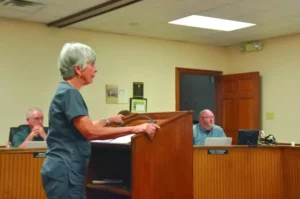Although officials from the City of Petal have received some updated numbers regarding the continuation of adding fluoride to the city’s water system, supply chain issues and other price quotes may delay that process somewhat.

The matter was discussed during a recent meeting of the Petal Board of Aldermen, where Mayor Tony Ducker said the city would need to invest approximately $36,000 to upgrade the equipment necessary for the process, including new pumps, aerators, pipes and holders. In addition, the mayor said the actual fluoride itself would cost anywhere from $5,000 to $10,000 per year.
“We’re still trying to get some firm numbers on it going forward, so the board can make a decision on if it’s economically feasible for us to do it,” Ducker said. “Even with that number, we would still have to get another number to be able to ‘wo-quote’ it – anything under $75,000, you have to ‘two-quote.’
“So by state law, we wouldn’t even be able to move on that number yet, and I still think there’s some supply chain issues that we would be dealing with. The big thing is to be able to get some firm numbers so the board can make a call one way or the other.”
Matt Fountain, project manager with Clearwater Solutions – which manages the City of Petal Public Works Department – said cities are now required to order fluoride by the pallet, rather than by individual bags. Each pallet contains 40 bags, which costs right at $7,000.
That amount would supply the city for approximately three months at each of its three supply stations.
“It’s 18 (bags) to start, and then about six bags a month to keep the system charged, is the way I call it,” Fountain said. “It’s six bags per well.”
Fountain also called into question the availability of fluoride, which could hamper the city’s efforts in that matter.
“if it so happens that if we come into a shortage of fluoride and then we can’t get our hands on it no more – which I’m not saying that’s the case, but if it is – then we’ve got to start the process all back over again,” he said. “That’s why we were talking about getting in shape to start stockpiling a little bit.
“But the problem is, if you get your hands on it, we can try to stockpile it, it’s still a supply chain issue.”
Aldermen have been discussing the fluoridation matter for the last several months, after Petal dentist Dr. Barbara Mauldin came before the board to address her concerns about the lack of fluoride in the city’s water supply. Mauldin has been in contact with several providers in various states to get information regarding price and availability of the product.
She has been a strong proponent of the measure – especially because of the stated benefits to children – saying that when fluoride is administered at a certain growth period throughout a child’s life, the chemical replaces a hydroxy molecule to form teeth, which makes teeth denser and helps them resist breakdown from acids.
Back in April, Mauldin told the board that she had found a few vendors to supply the fluoride, but Fountain said he had experienced difficulty finding a vendor with an available stock. One company, for example, told him they had 200 bags in stock, but 400 already were allocated and the date of the next shipment was unknown.
According to the Mississippi State Department of Health’s website, fluoride has been proven to protect teeth from decay, helping to rebuild and strengthen the tooth surface by replenishing minerals. Samantha McCain, who serves as chief communication officer for the City of Hattiesburg, said to the best of her knowledge, there has never been a problem procuring fluoride, and prices are currently normal.
The City of Petal began adding fluoride to its water supply in 2011. Approximately one-third of city residents, however, don’t receive the chemical in their drinking water, including customers of Barrontown Utility Association.
From October 2021 to August 2022, the City of Petal used 65 bags of fluoride; the previous year it used 112 bags. As of Mauldin’s first visit to the board, the city had not been able to obtain fluoride for approximately two months.
Studies from the American Public Health Association show fluoridated water prevents at least 25 percent of tooth decay in children and adults, along with the use of other fluoride products. In addition, the U.S. Centers for Disease Control and Prevention considers the fluoridation of water to be “one of the 10 great public health achievements of the 20th century.”
Fluoridation does have its opponents, however. The website of the National Center for Biotechnology Information – www.ncbi.nlm.nih.gov – lists several pros for the measure, but a few alleged cons as well.
Those include the fact that excessive fluoride intake may cause dental fluorosis; water may possibly be contaminated with toxic chemicals while being fluoridated; the effectiveness of fluoridation was not validated by any randomized controlled trial; and the U.S. Food and Drug Administration had previously classified fluoride as an “unapproved new drug.”
If the city’s fluoridization were to be discontinued, the board would have to notify the Mississippi Department of Health, as well as the residents of the City of Petal.
*Original full-text article online at: https://www.hubcityspokes.com/local-content/city-petal-still-looking-concrete-numbers-fluoridization-water-system
